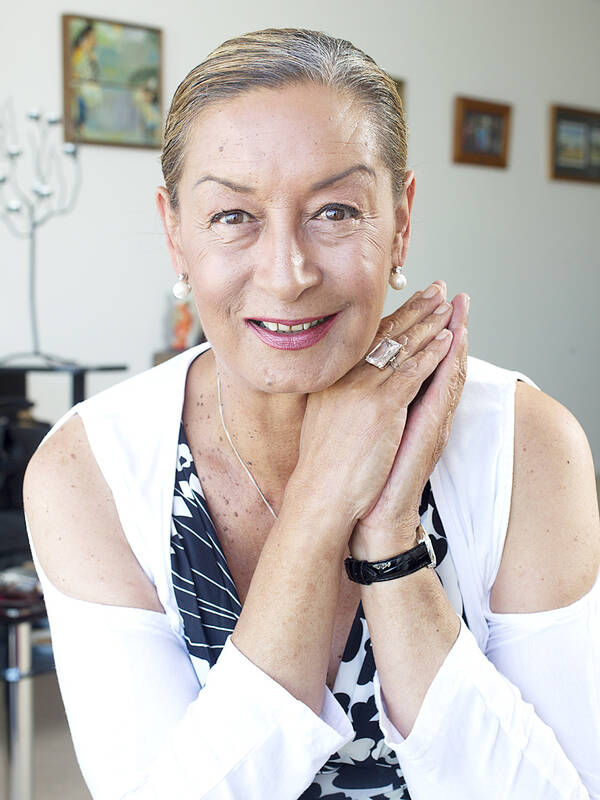Georgina Beyer, a trailblazing New Zealand politician who in 1999 became the world’s first openly transgender lawmaker, died yesterday at the age of 65.
Friends of Beyer said she died peacefully in hospice care. They did not immediately give a cause of death, although Beyer had previously had kidney failure and underwent a kidney transplant in 2017.
New Zealand Prime Minister Chris Hipkins said he did not know Beyer well personally, but knew she had a large following within New Zealand and had made a lasting impression on the nation’s parliament.

Photo: AP
“I certainly think that Georgina has blazed a trail that has made it much easier for others to follow,” Hipkins said.
Friend Malcolm Vaughan yesterday said that he was still with Beyer, who he had known for decades, and did not yet feel ready to talk about her life. He and his husband, Scott Kennedy, instead put out a statement.
“Georgie was surrounded by her nearest and dearest 24/7 over the past week, she accepted what was happening, was cracking jokes and had a twinkle in her eye, right until the final moment,” they wrote.
They said she was a national treasure, or “taonga” in Maori.
“Farewell Georgie, your love, compassion and all that you have done for the rainbow and many other communities will live on for ever,” they wrote.
Beyer, who was Maori, worked as a sex worker and nightclub performer before turning to politics. In 1995, she was elected mayor of the small North Island town of Carterton. Four years later, she won national office for the liberal Labour Party and remained a lawmaker until 2007.
She helped pass the landmark 2003 Prostitution Reform Act, which decriminalized sex work.
In a speech to lawmakers at the time, she said that the protections the new law offered might have spared her being dragged into the sex industry at the age of 16, and from sex workers being threatened and raped without being able to seek help from police.
In 2004, she helped pass a law allowing same-sex civil unions. Nine years later, New Zealand passed a law allowing same-sex marriage.

Packed crowds in India celebrating their cricket team’s victory ended in a deadly stampede on Wednesday, with 11 mainly young fans crushed to death, the local state’s chief minister said. Joyous cricket fans had come out to celebrate and welcome home their heroes, Royal Challengers Bengaluru, after they beat Punjab Kings in a roller-coaster Indian Premier League (IPL) cricket final on Tuesday night. However, the euphoria of the vast crowds in the southern tech city of Bengaluru ended in disaster, with Indian Prime Minister Narendra calling it “absolutely heartrending.” Karnataka Chief Minister Siddaramaiah said most of the deceased are young, with 11 dead

By 2027, Denmark would relocate its foreign convicts to a prison in Kosovo under a 200-million-euro (US$228.6 million) agreement that has raised concerns among non-governmental organizations (NGOs) and residents, but which could serve as a model for the rest of the EU. The agreement, reached in 2022 and ratified by Kosovar lawmakers last year, provides for the reception of up to 300 foreign prisoners sentenced in Denmark. They must not have been convicted of terrorism or war crimes, or have a mental condition or terminal disease. Once their sentence is completed in Kosovan, they would be deported to their home country. In

Brazil, the world’s largest Roman Catholic country, saw its Catholic population decline further in 2022, while evangelical Christians and those with no religion continued to rise, census data released on Friday by the Brazilian Institute of Geography and Statistics (IBGE) showed. The census indicated that Brazil had 100.2 million Roman Catholics in 2022, accounting for 56.7 percent of the population, down from 65.1 percent or 105.4 million recorded in the 2010 census. Meanwhile, the share of evangelical Christians rose to 26.9 percent last year, up from 21.6 percent in 2010, adding 12 million followers to reach 47.4 million — the highest figure

LOST CONTACT: The mission carried payloads from Japan, the US and Taiwan’s National Central University, including a deep space radiation probe, ispace said Japanese company ispace said its uncrewed moon lander likely crashed onto the moon’s surface during its lunar touchdown attempt yesterday, marking another failure two years after its unsuccessful inaugural mission. Tokyo-based ispace had hoped to join US firms Intuitive Machines and Firefly Aerospace as companies that have accomplished commercial landings amid a global race for the moon, which includes state-run missions from China and India. A successful mission would have made ispace the first company outside the US to achieve a moon landing. Resilience, ispace’s second lunar lander, could not decelerate fast enough as it approached the moon, and the company has